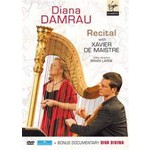
Recital at Baden Baden & Documentary 'Diva Divina'
 $30.00
Out of Stock
$30.00
Out of Stock6+ weeks add to cart
SCHUMANN / FAURE / DEBUSSY / R. STRAUSS
Recital at Baden Baden & Documentary 'Diva Divina'
Diana Damrau (soprano), Xavier de Maistre (harp)
[ Virgin DVD / DVD ]
Release Date: Monday 13 May 2013
This item is currently out of stock. It may take 6 or more weeks to obtain from when you place your order as this is a specialist product.
This DVD, centered on the dazzling German soprano Diana Damrau, complements a ravishing recital with a fascinating documentary.
In March 2013, Damrau achieved "a daring victory" (in the words of the New York Times) when the Metropolitan Opera witnessed her first-ever performances of Verdi's La traviata. In recent years she has made the transition from glittering, stratospheric roles such as Mozart's Queen of the Night and Strauss' Zerbinetta to lyrical heroines of greater emotional complexity, such as Gilda in Rigoletto, Adina in L'elisir d'amore and Lucia di Lammermoor. A series of triumphs at the Met have made her a favourite singer in New York - as she is in other leading opera houses around the world.
In the documentary, Diana Damrau - Diva Divina, the soprano explains that, when she was just 12 years old, it was La traviata (in Franco Zeffirelli's lavish 1982 cinematic version) that inspired her to make a career in opera. The documentary, directed by Beatrix Conrad, follows Damrau over the course of nine months, covering operatic performances and rehearsals in Geneva, New York, Paris and Munich, recitals, recordings and the arrival of her first child, Alexander.
The recital, filmed at the impressive Festspielhaus in Baden-Baden, pairs Damrau with the French harpist Xavier de Maistre in an exquisite selection of songs by Schumann, Fauré, Debussy and Strauss. Among the best-loved items in the programme are: Schumann's 'Widmung'; both Fauré's and Debussy's settings of Verlaine's poem 'Clair de lune'; Fauré's 'Après un rêve'; a harp arrangement of Debussy's piano Arabesque No 1; Strauss' 'Morgen' and 'Ständchen' and, among the encores, the famed Bach-Gounod 'Ave Maria'.
In the course of 2013, Damrau and de Maistre will also perform together in concert seasons in Washington D.C., Paris, Geneva, Lyon, Reykjavik, Hamburg, Munich and London and at festivals in Menton, Gstaad, Schwarzenberg and Grafenegg.
Reviewing the performance in Baden-Baden - for which the audience joined Damrau and de Maistre on the stage, rather than being distanced from them in the expansive auditorium - the Badische Neueste Nachrichten wrote of Damrau as a recitalist "whose vocal material and abilities as a storyteller approach perfection", while the Badisches Tagblatt said:" Damrau's diction is a pleasure, her vocal flexibility amazing. She sings phrases with ample breath, while her nuanced shadings create subtle changes of mood from song to song." Die Rheinpfalz described the "gentle, sometimes ethereal tones of the harp" as being in perfect harmony with the "exceptionally subtle and detailed vocal art of the soprano … particularly exceptional are the delicate tracery and colours of Diana Damrau's singing. Her shaping and accenting of the text is meticulous, her phrasing is of great sensitivity and her dynamics are richly nuanced, yet her song performances are never mannered, rather always full of lyrical feeling."
Tracks:
Debussy:
Nuit d'étoiles
Le Lilas
Fleur des blés (André Girod)
Claire de lune (song)
Mandoline (Verlaine)
Beau Soir
Apparition - song (1884)
Arabesque No. 1
Fauré:
Impromptu No. 6 in D flat major for harp, Op. 86
Après un rêve, Op. 7 No. 1
Clair de Lune, Op. 46 No. 2
Sérénade toscane Op. 3 No. 2
Les berceaux, Op. 23 No. 1
Adieu, Op. 21 No. 3, from Poème d'un jour
Notre amour Op. 23 No. 2
Gounod:
Ave Maria
Schumann:
Lied der Suleika, Op. 25 No. 9
Der Nussbaum, Op. 25 No. 3
Die Lotosblume, Op. 25 No. 7
Er ist's! Op. 79 No. 23 (Eduard Mörike)
Widmung, Op. 25 No. 1
Strauss, R:
Nichts, Op. 10 No. 2
Freundliche Vision, Op. 48 No. 1
All mein Gedanken ... Op. 21 No. 1
Wiegenlied, Op. 41 No. 1
Die Nacht, Op. 10 No. 3
Morgen, Op. 27 No. 4
Kling! Op. 48 No. 3
Ständchen, Op. 17 No. 2